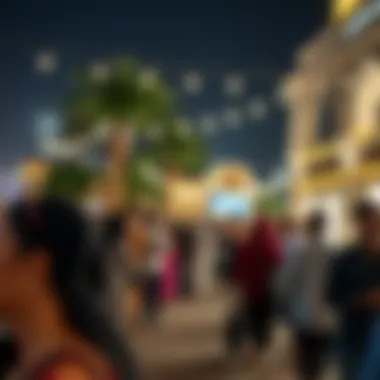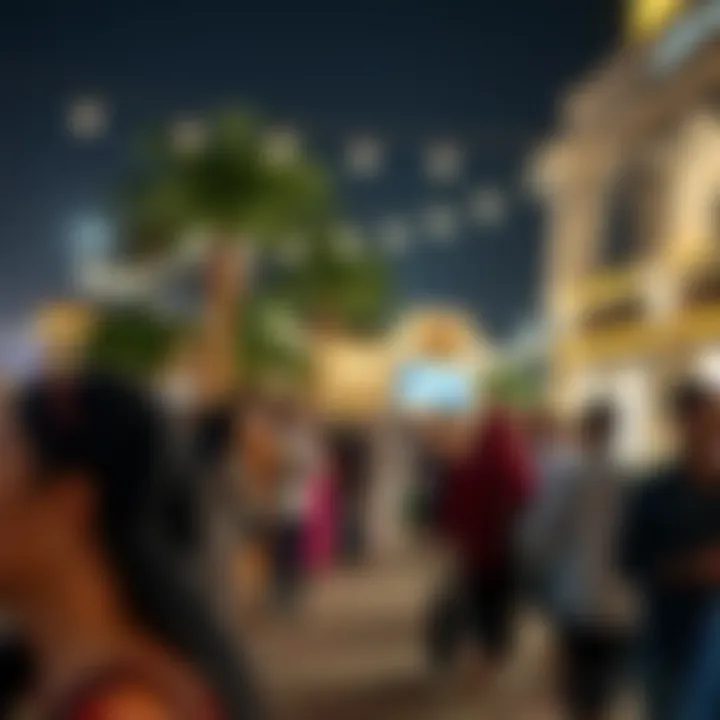Ramadan 2023 in the UAE: Cultural and Economic Insights


Intro
Ramadan holds a significant place in the cultural fabric of the United Arab Emirates, particularly in 2023, as the world continues to navigate the complexities brought by global uncertainties. This month, dedicated to fasting, prayer, and community, transcends mere spirituality. It touches on various sectors, including social dynamics and, notably, the economic landscape.
Investors and residents alike stand to gain from a keen understanding of how Ramadan shapes the real estate market in the UAE. Amidst the shimmering skyscrapers of Dubai, where modernity meets tradition, the observance of Ramadan influences not just individual behavior but also larger economic trends.
From the bustling souks echoing with the sounds of Iftar gatherings to high-end dining establishments offering special Ramadan menus, the UAE’s cultural heart beats loudly during this month. Moreover, the behaviors and preferences of consumers during this period can significantly sway the property market, making it essential for investors to stay informed.
As this article delves into Ramadan's impact on the real estate sector, we will explore everything from community involvement to the implications of fasting on consumer spending behaviors.
"During Ramadan, the nights come alive with festivities while the days are marked with reflection and restraint, making this month a unique period for both the spiritual and the economic realms.”
By navigating these insights, you will grasp how Ramadan serves as more than just a time for personal reflection; it shapes the broader context of property values, investment opportunities, and community relations within the UAE's vibrant landscape. Stay tuned as we unravel the nuances of this holy month and its ripple effects on the market.
Market Insights
Current Trends in Dubai Real Estate
As Ramadan progresses, certain trends in Dubai's real estate market begin to emerge. Traditionally, the month sees a shift in buyer behavior, as families often focus more on community and less on major investments. However, this year, the resilience of the property sector is evident.
- Increased Demand for Family-Friendly Properties:
Families tend to seek larger homes that can accommodate gatherings during Iftar, which has led to a spike in demand for villas and townhouses in suburban areas. - Significance of Location:
Proximity to mosques and community centers has become a prime factor for buyers. Areas like Jumeirah and Al Barsha witness heightened interest due to accessible amenities enriched by cultural activities during the month. - Shift in Commercial Spaces:
Restaurants and food businesses have started investing in locations that cater to Iftar and Suhoor, further tilting the market towards properties that align with Ramadan activities.
Economic Factors Impacting Property Values
Several economic indicators highlight how Ramadan affects property values. Wealth distribution and purchasing behaviors shift, bringing unique challenges and opportunities. Key factors to consider include:
- Consumer Spending Trends: During Ramadan, spending often shifts towards food and social activities. Investors must recognize that property investments tied more to lifestyle amenities may flourish.
- Regulatory Changes: Local governments may adjust policies to foster growth or support community needs, particularly in hospitality and retail. Keeping an eye on updates from the Abu Dhabi Department of Economic Development or Dubai Land Department can provide beneficial insights.
- Market Sentiment: Investors often weigh the impact of Ramadan on overall consumer confidence. Positive sentiments can drive property values up, particularly for developments that purposely align with community needs during this holy month.
As we continue the exploration, we will dive deeper into investment guides focusing on strategies tailored for the unique landscape of Ramadan 2023.
Prelude to Ramadan
Ramadan holds a special place in the hearts of Muslims around the world. This month of fasting transcends mere abstinence from food and drink; it is a time for deep spiritual reflection, self-improvement, and heightened social consciousness. Understanding Ramadan is not just about recognizing its significance as a month of devotion but also about grasping its profound impact on culture, economy, and community dynamics within the United Arab Emirates.
Understanding Ramadan
At its core, Ramadan is the ninth month of the Islamic lunar calendar, considered the holiest period for Muslims. During this month, individuals engage in fasting from dawn until dusk, which is a practice known as Sawm. This fasting is not only a physical exercise but a holistic endeavor aimed at spiritual elevation and a demonstration of faith. The act of fasting is complemented by increased prayer and recitation of the Quran, allowing individuals to connect more profoundly with their spirituality.
In the UAE, this month significantly impacts daily life and routines. Businesses adjust their operating hours, families gather for meals at sunset, and the community thrives on charitable activities aimed at helping those in need. Understanding these dynamics is crucial for investors and residents alike, as the effects of Ramadan ripple through every facet of life, from the social arena to economic trends.
Historical Context of Ramadan
The origins of Ramadan date back to the time of the Prophet Muhammad, who is believed to have received the first revelations of the Quran during this month. This connection imbues Ramadan with both religious significance and a historical context that emphasizes its importance in the Muslim faith.
Over the centuries, Ramadan has evolved, yet its core tenets remain unchanged. It serves as a moment of unity among Muslims, fostering a sense of community and reinforcing the values of patience, empathy, and gratefulness. In the UAE, this historical backdrop informs the way Ramadan is celebrated today, with traditional customs blending seamlessly with modern practices. Community iftars, for instance, are a popular way to break the fast, emphasising both tradition and the importance of togetherness in an increasingly diverse society.
Moving forward, understanding these aspects of Ramadan not only aids in grasping its personal significance but also highlights its broader implications in the UAE, affecting sectors such as hospitality, retail, and real estate. As such, this examination extends beyond mere observance, framing Ramadan as a critical period for social cohesion and economic activity in the region.
Ramadan Dates and Significance
Ramadan holds profound meaning for millions around the globe, particularly within the UAE, where its influence permeates various aspects of life. Understanding the dates and significance of Ramadan in 2023 is crucial for anyone engaging with the local culture, especially investors, agents, and residents. This holy month is not simply about fasting; it’s a period that embodies spirituality, community, and economic shifts. This section aims to outline the essential dates and the importance of the observance in the UAE.
Start and End Dates in the UAE
For 2023, Ramadan is expected to commence on the evening of Wednesday, March 22, with the sighting of the moon determining the exact start. The month will likely conclude on the evening of Friday, April 21, culminating in Eid al-Fitr, a festive celebration marking the end of fasting.
The significance of these dates lies not merely in their calendar placement but in what they represent — a period of deep reflection, self-improvement, and community cohesion. As the month progresses, local businesses may adjust their hours to accommodate fasting schedules, leading to unique shopping experiences. For example, many shops and restaurants open later in the evening, responding to the evening surge in activity post-Iftar. This flexibility is essential for those navigating both personal and professional responsibilities during Ramadan.
Astrological Considerations
Astrology plays a role in determining Islamic dates, including Ramadan. The Islamic calendar is lunar-based, and the sighting of the new moon directly influences the start and conclusion of Ramadan. This reliance on celestial phenomena adds an element of anticipation and community engagement.
In the UAE, the moon sighting for Ramadan often garners significant attention, with local authorities and religious leaders collaborating to confirm sightings. These astrological considerations not only influence dates but also inspire a communal spirit as families gather to follow astronomical reports closely.


As Ramadan approaches, it becomes a focal point for investment considerations. Knowing the changes in social dynamics and consumer behavior can significantly affect how businesses operate. Investors who pay attention to these astrological patterns can better align their strategies, tapping into the distinctive ebb and flow of spending during this holy month.
Overall, understanding Ramadan 2023’s dates and significance in the UAE is essential for navigating its cultural marketplace. As this holy month approaches, businesses and individuals alike must recognize the unique intersection of faith, community, and economic shifts that define this period.
Social and Cultural Observances
Social and cultural observances during Ramadan play a pivotal role in fostering community spirit and reinforcing shared values within the UAE. As residents and visitors partake in the rituals and celebrations associated with this holy month, a rich tapestry of tradition emerges. These observances not only provide insight into the cultural fabric of the Emirates but also create a warm environment conducive for investors to understand the local market dynamics.
Iftar Traditions
Iftar, the meal that breaks the fast at sunset, serves as a cornerstone of Ramadan’s social interaction. Traditionally, families gather to share delicious meals, and this communal aspect is a hallmark of the holy month. In 2023, many restaurants and hotels in the UAE are stepping up their game, offering lavish iftar buffets that showcase an array of cuisines—from traditional Emirati dishes to international favorites. It's not just a meal; it’s an experience, often accompanied by festive decorations and performances.
Furthermore, the concept of sharing is amplified during iftar. Many establishments participate in charitable initiatives, providing meals to the less fortunate. This altruistic inclination is a reminder that Ramadan is as much about community as it is about spirituality. Local eateries, such as Al Fanar Restaurant & Cafe or Ravi Restaurant, are known for their generous iftar offerings, which often include complementary meals for those in need. A mix of flavors and traditions creates not only a feast but a gathering that enriches relationships.
"Iftar is the heart of Ramadan, a time to come together, reflect, and share abundance with others."
Community Involvement During Ramadan
Community involvement during Ramadan goes beyond shared meals; it encompasses a spirit of togetherness and active engagement. Many groups and organizations encourage volunteerism; people from diverse backgrounds come together to offer their time and resources to various causes. Whether it's delivering food packages to those in need or organizing neighborhood iftar gatherings, participation in these activities fosters unity.
In 2023, there’s a strong push for digital engagement, with social media campaigns encouraging individuals to share their own traditions and experiences. Platforms like Instagram and Facebook often see unique hashtags pop up, where people share photos of their iftar tables or charitable activities. Such digital storytelling not only helps preserve cultural practices but also allows for a global audience to connect with the richness of Emirati traditions.
Additionally, community centers across the UAE organize activities for both adults and children, from Ramadan trivia nights to charity runs. These events provide an opportunity for residents to engage thoughtfully with the community while honoring Ramadan's values of compassion and generosity.
In essence, Ramadan serves as a reminder for social responsibility and compassion, encouraging everyone, from residents to investors, to appreciate and engage with the cultural values that define the UAE.
Economic Implications of Ramadan
Understanding the economic implications of Ramadan offers a multifaceted perspective on how this holy month influences various sectors in the UAE. It’s not just about fasting; it’s about the intricate dance between tradition and the economy. Businesses brace themselves for a unique rhythm during this month, making it crucial for investors and stakeholders to grasp the changes at play.
Impact on Retail and Dining Sectors
Ramadan undoubtedly casts a long shadow over the retail and dining landscapes of the UAE. As families come together to break their fast, often referred to as Iftar, the demand for food and groceries rises sharply. Market research indicates that spending peaks during this period, with an observable shift towards specific goods. Fresh fruits, dates, and traditional meals find their way onto more shopping lists than usual.
Many retailers ramp up their marketing efforts, using engaging displays and special promotions to entice customers. Consider how brands like Carrefour or Lulu Hypermarket create special Ramadan sections; such strategic moves maximize foot traffic and sales. Late-night shopping hours often become a norm, allowing families to shop post-Iftar, presenting a prime opportunity for retailers.
On the dining side, restaurants pivot their offerings to cater to the influx of patrons seeking Iftar menus. Establishments offering buffet spreads generally experience a boom in reservations, and many might find themselves fully booked for days in advance. The overall increase in footfall translates to higher revenue, enabling some eateries to thrive where they might have struggled earlier in the year.
"Increased demand during Ramadan can positively affect the bottom line for both retail chains and independent restaurants, turning what might have been a slow period into a prosperous one."
Companies often offer special meals tailored for the breaking of the fast, and many even collaborate with local charities to provide meals for those in need. This blending of business with goodwill not only enhances their public image but opens new avenues for customer engagement.
Real Estate Dynamics During Ramadan
Shifting to real estate, Ramadan introduces specific shifts in market dynamics. The effects can be quite nuanced, ranging from changes in prospective buyers' behaviors to adjustments in rental agreements. Investors should note that traditional buying and selling activities typically slow during Ramadan, as many people prioritize family and spiritual reflection over real estate dealings. However, this doesn’t mean real estate is stagnant.
During Ramadan, properties that offer amenities supportive of community and social gatherings often gain increased attention. For instance, homes with large family-friendly kitchens or those close to mosques become hot properties. The flexibility of rental agreements during this month—particularly in vacation areas—proves profitable, as short-term stays often become the go-to for families visiting from abroad.
A number of expats also consider Ramadan a good time to either invest in long-term rentals or secure properties for the following season, as landlords may be more willing to negotiate terms in a slightly less competitive atmosphere. This potential for negotiation can prove lucrative, especially for investors with a keen eye for timing.
In summary, Ramadan in the UAE shakes up both retail and real estate sectors, highlighting the intertwined nature of culture, tradition, and economic activity. Investors, agents, and developers should keep their ears to the ground, as the month brings unique opportunities for engagement and growth.
Legal Regulations Food and Business
Understanding the legal regulations surrounding food and business during Ramadan is crucial for anyone operating in the UAE. This month is not just a time for spiritual reflection; it creates a unique blend of challenges and opportunities for businesses. Simply put, adhering to these regulations can mean the difference between a flourishing operation and costly penalties.
The UAE has a set of regulations that ensures the sanctity of Ramadan is honored while simultaneously promoting business activities. These guidelines have implications not only for local businesses but also for those operated by foreign entities. Companies must be well-informed to foster goodwill with customers and ensure compliance with local customs and traditions.
Business Hours and Restrictions
During Ramadan, business hours undergo modifications to respect the fasting schedule. Generally, most businesses operate on reduced hours, with many shops opening later in the day. For instance, while some establishments may usually run from 9 a.m. to 10 p.m., Ramadan might see them open from around 10 a.m. to 5 p.m. before a second shift begins post-Iftar.
Notably, public sector offices often shift their typical operating hours to align better with the community's needs. It is essential for private businesses to stay informed about such adjustments, as this can affect their operational strategy. Not acting in accordance with these hours may lead to reputational damage or even direct governmental action, putting a company's standing at risk.
Factors to consider regarding business hours and restrictions include:


- Flexibility: Businesses might find success by adapting to the new hours or creating specific Iftar promotions to draw in customers during this time.
- Awareness: It’s beneficial for businesses to communicate effectively with employees and customers about any changes in operations, demonstrating a respect for both the holy month and their patronage.
- Plan Ahead: Early planning for stock and staffing during the reduced hours helps mitigate any potential losses and maximize productivity.
Compliance for Non-Muslim Entities
Non-Muslim enterprises must navigate the rules concerning food service and business activities during Ramadan as well. The UAE encourages a spirit of respect and understanding among its diverse population, which includes many professionals and businesses from various backgrounds. This means non-Muslim businesses must be aware that some practices may be viewed differently during Ramadan.
Among the requirements for non-Muslim entities are:
- Dining Regulations: Many dining establishments must close their doors during daylight hours or provide some method for customers to dine discreetly.
- Advertising Practices: Advertisements during this sacred month should be culturally sensitive, avoiding any themes that might be considered disrespectful or inappropriate in the context of Ramadan.
- Staff Policies: Managers must ensure that non-Muslim employees are educated about the significance of Ramadan and sensitive to their Muslim colleagues’ fasting practices, including encouraging private eating areas during the day.
Compliance with these regulations not only avoids potential fines but also fosters a community spirit and consensus within a culturally rich and diverse country as the UAE.
In summary, businesses within the UAE face a unique landscape during Ramadan that requires careful navigation. With an understanding of legal regulations, flexibility in operations, and a spirit of community inclusiveness, both local and non-local entities can thrive while respecting the essence of this significant month.
Ramadan and Community Activities
The essence of Ramadan in the UAE transcends individual observance; it vibrates through the very fabric of communities. As the holy month unfolds, a spirit of togetherness encapsulates the nation, drawing both residents and visitors into the vibrant tapestry of cultural activities and altruistic initiatives. This section dives into the dual facets of charitable and cultural engagements, exhibiting how these community activities during Ramadan forge bonds, reinforce social responsibility, and highlight the UAE's commitment to inclusivity and generosity.
Charitable Initiatives
Charity in Ramadan is akin to a fundamental rhythm that underpins much of the month's activities. Known as Zakat, the practice is embedded not only as a religious duty but also as a powerful social instrument. In the UAE, charitable initiatives burgeon during Ramadan, with entities like Dubai Cares and Emirates Red Crescent leading the charge. These organizations mobilize resources and volunteers to address a melting pot of issues—from poverty alleviation to educational support.
According to reports, approximately 80% of residents actively participate in charitable acts during this holy month. This statistic is not mere numbers; it speaks volumes about the community's heart. For instance, food donation drives thrive, where individuals and businesses contribute meals for iftar—the meal to break the fast—providing sustenance to less fortunate families. Such initiatives not only alleviate hunger but also symbolize solidarity and shared values among diverse backgrounds.
The collaboration with local mosques enhances these charitable endeavors. By serving as drop-off points, they become community hubs where generosity flows freely.
- Key Benefits of Charitable Initiatives in Ramadan:
- Strengthening community ties among various cultural segments.
- Amplifying awareness around social issues, encouraging a proactive approach.
- Cultivating a culture of giving—a legacy of compassion that persists beyond Ramadan.
This charitable atmosphere, palpable throughout the country, fosters personal growth while also leaving a lasting imprint on the fabric of community life.
Cultural Events and Activities
The vibrant cultural landscape during Ramadan serves as a magnificent backdrop for communal unity. From evening markets to art exhibitions, the UAE presents a plethora of activities that captivate not just the residents but also tourists eager to experience the local customs in their full glory.
- The Ramadan Night Market at Dubai World Trade Centre* is particularly noteworthy. This bustling hub showcases local artisans, offering goods ranging from handmade crafts to mouth-watering street food. It becomes a social magnet, drawing families and friends together, creating an atmosphere of festivity and celebration. Additionally, workshops on Arabic calligraphy and oud-playing allow participants to gain hands-on experience in traditional art forms, fostering appreciation for the Emirati heritage.
Moreover, cultural programming on local media channels promotes awareness by hosting discussion panels and documentaries about Ramadan's significance and various customs in different parts of the world. Events like these serve as platforms for education, breaking down cultural barriers, and encouraging cross-community dialogue.
Each of these activities not only celebrates the spirit of Ramadan but also reinforces the UAE's identity as a harmonious melting pot where diverse cultures converge.
As the sun sets each evening during this sacred period, not only are meals shared, but so are hopes, dreams, and a collective commitment to a brighter future.
Real Estate Perspectives
Understanding the dynamics of real estate during Ramadan offers a unique lens through which to view market trends, consumer behaviors, and the overall economic climate of the UAE. This month is not only a time of spiritual reflection, but it also influences various sectors, particularly real estate, making it deserving of a closer look.
Market Trends During Ramadan
Ramadan brings about a subtle but significant shift in the real estate landscape. Typically, there is a slowdown in transactions as many people are preoccupied with their religious obligations. However, this slowdown is often counterbalanced by certain trends that tend to emerge during this holy month. For instance, there’s a noticeable increase in demand for rental properties as families and individuals often seek temporary residences closer to mosques or community centers to engage in festivities.
- Increased Demand for Short-Term Rentals: Properties available for short-term rent see heightened interest. Many expatriates and locals prefer spacious accommodations to invite family and friends for iftar parties, thus driving demand in the market.
- Price Adjustments: Property owners sometimes adjust their pricing strategies due to the anticipated dip in visitor numbers. They may offer promotions and discounts to attract potential renters or buyers, leading to varying rental prices and sales strategies throughout the month.
- Shift in Marketing Strategies: Real estate agents employ targeted marketing strategies focusing on community aspects, highlighting properties that offer easy access to communal activities during Ramadan.
This pattern suggests that while overall activity may slow down, Ramadan presents a unique opportunity for savvy investors to acquire properties at potentially favorable rates.
Investment Opportunities
Investors looking to capitalize during Ramadan should focus on certain elements that signify potential growth within the real estate market. The holy month serves as a backdrop for various community-centric developments, paving the way for profitable investments.
- Community-focused Developments: Properties situated in areas known for cultural and religious significance often see an influx in demand. Developments near mosques or community centers can be particularly appealing as they promise consistent occupancy rates not only during Ramadan but throughout the year.
- Gated Communities and Family Units: Investors could find value in investing in gated communities where families prefer to reside for increased security and enhanced community engagement. These areas tend to maintain their appeal as families prefer environments conducive to shared values during Ramadan.
- Commercial Spaces Catering to Ramadan Needs: Establishing or investing in retail spaces that cater to the Ramadan requirements—such as supermarkets offering special iftar options or signage that resonates with the community spirit—can yield substantial returns.
Creating a vision for investments that align with the unique cultural and familial dynamics present during Ramadan can lead to successful outcomes. As outlined, understanding these perspectives can help investors make informed decisions while positively impacting community engagement and development. With careful planning, one can navigate this landscape effectively, blending market needs with the greater societal implications of the holy month.
Through adaptation to the rhythms of Ramadan, the real estate sector has the chance not only to thrive but also to foster community ties that sustain beyond the month.


For more insights into the broader implications of Ramadan on the marketplace, consider exploring sources like Britannica or Wikipedia.
Challenges During Ramadan
Ramadan, though a profoundly spiritual time of reflection and community, also presents a unique set of challenges. These hurdles can significantly influence both the social fabric and the business landscape in the UAE, particularly during 2023. Understanding these challenges is essential for investors, managers, and community members alike. It’s not all about fasting and celebrations; behind the scenes, various operational complexities arise, shaping the dynamics of the month.
Operational Challenges for Businesses
For businesses, the challenges posed by Ramadan can be as nuanced as they are consequential. Understanding customer behavior shifts becomes crucial. Many organizations find that their typical business operations must be adjusted.
Shortened Business Hours: One of the most palpable changes during Ramadan is the alteration in operational hours. Many workplaces reduce their working hours, which can throw a wrench into productivity levels. For example, retail stores often close earlier or open later to accommodate customers’ fasting schedules. The knee-jerk reaction might be to cut employees’ hours, but that doesn’t always lead to a smoother operation. Holding back from drastic measures can be key; employees who feel secure and valued often yield better results.
Increased Staff Demand: Even with reduced hours, the demand for hospitality and service staff tends to spike, especially during iftar. Restaurants facing unforeseen crowds may struggle with staffing shortages or logistics. It leads to rushed service and, at times, customer dissatisfaction. Therefore, planning ahead to avoid these problems is essential. Drawing in temporary staff or reallocating tasks can help balance the load, but it necessitates foresight and preparation.
Supply Chain Issues: Many companies also experience difficulties with supply chains as the demand for food and other goods rises sharply to meet the nightly celebrations. Vendors might find it hard to keep up, leading to shortages affecting businesses reliant on timely deliveries. Building solid relationships with suppliers and diversifying sources can cushion the blow against these potential snags.
Social Tensions and Misunderstandings
The spirit of Ramadan promotes unity, yet social tensions can bubble beneath the surface, particularly among diverse communities within the UAE. Misunderstandings arise, especially among non-Muslims who may not be fully aware of the traditions or the regulations surrounding Ramadan.
Cultural Sensitivity: For individuals from other backgrounds, navigating this month can feel like walking a tightrope. Fasting schedules and increased activeness from certain groups might not align with their regular life patterns. Non-Muslims might inadvertently consume food in public spaces or be unaware of the social norms during fasting hours, leading to discomfort or conflicts. This could be addressed through community outreach programs that educate and encourage empathy among different cultures.
Public Perception: Non-compliance with Ramadan etiquette can also lead to perceived social stigma. The fear of being judged can dissuade individuals from partaking in public activities, creating a sense of alienation. Raising awareness and fostering an inclusive environment, where people can express their traditions respectfully, is vital. Building forums for dialogue and promoting interfaith activities might help reduce these tensions.
"Embracing cultural differences during Ramadan can pave the way for stronger community ties and shared experiences."
Both businesses and social organizations need to recognize these challenges and adapt accordingly. The learning curve might be steep, but the rewards of establishing a respectful, inclusive environment during Ramadan are manifold; a harmony that benefits all sectors of society.
Case Studies: Local Responses
In exploring the varied layers of Ramadan's impact in the UAE, analyzing local responses showcases how businesses and communities adapt to this pivotal time. These case studies illustrate not only how companies innovate but also how they respond to socio-cultural demands during the holy month. Essentially, this section delves into real-life applications and strategies, providing insights that might serve as models for future endeavors.
Successful Businesses during Ramadan
Several businesses have tailored their strategies to harness the unique essence of Ramadan. One prime example is the Emaar Properties, which runs various community-driven initiatives that resonate deeply with the spirit of giving. They have created special packages for Iftar gatherings that cater to families and large groups, forging a strong connection between their offerings and social dining experiences. These packages not only boost their sales but also enhance community cohesion, making dining during Ramadan more inclusive.
Accompanying this is Majid Al Futtaim, which has adjusted its retail hours significantly to accommodate fasting hours. Their Carrefour outlets, for instance, have extended late-night shopping hours, recognizing that many shoppers prefer to buy groceries post-Iftar. This change increased foot traffic, as families come together to purchase the food that they'll break their fast with. The success of these initiatives is evident in the notable increase in sales during the month—an empirical affirmation of aligning business strategies with community needs.
Moreover, Café Bateel has become a beacon of Ramadan by introducing unique date assortments and traditional dishes that cater to the fasting population. Their menu tweaks reflect an understanding of what consumers crave during this month, resulting in higher customer satisfaction and loyalty. Emphasizing local flavors and heritage, they offer a dining experience that is both familiar and comforting to residents and visitors alike.
Community Initiatives: Lessons Learned
Through community-centric initiatives during Ramadan, various organizations have uncovered valuable lessons. A standout case is the Dubai Cares charity, which runs educational programs for underprivileged children. During Ramadan, they ramp up fundraising efforts, encouraging individuals and corporations to contribute through creative campaigns. The robustness of their initiatives teaches the importance of mobilizing a community around a cause that resonates deeply with the ethos of Ramadan—helping those in need.
Cultivating a sense of shared responsibility, local mosques have partnered with different businesses to provide iftar meals free of charge to those who might be struggling financially. Such partnerships epitomize community solidarity, serving as a reminder of the communal spirit Ramadan promotes. This outreach has helped augment the reach of the businesses involved, while also fostering goodwill and appreciation in the community.
Furthermore, events such as Ramadan Night Markets in local neighborhoods have emerged, emphasizing the role of enterprise in creating communal spaces for interaction. Local vendors get a platform to sell their goods, wrapped in a festive atmosphere, further contributing to a sense of unity. The shared experiences at these markets strengthen local economies and encourage return customers who yearn for authentic products tied to their culture.
Ultimately, the case studies from Ramadan highlight the dual nature of success—where both businesses and communities benefit. By thriving in a manner that respects traditions while innovating, these examples showcase a roadmap for sustainable practices that other regions can adapt into their own Ramadan observances.
Epilogue: The Significance of Ramadan in UAE
Ramadan holds a special place in the hearts and minds of people in the UAE. Reflecting an intricate fusion of spirituality, community, and cultural identity, this holy month affects various aspects of life in the region. From deepening personal faith among believers to impacting the retail and real estate sectors, its significance cannot be understated.
Reflections on Ramadan's Impact
During Ramadan, there's a palpable change in the atmosphere. This month prompts individuals to reflect on their values, ethics, and how they relate to others. Many businesses adjust their operations, demonstrating flexibility and understanding of community needs. This spirit of adaptability is not just beneficial for business; it enriches the overall community fabric. The impact on local customs is significant, as traditions such as Iftar gatherings emerge, forging deeper connections among families and friends.
Moreover, charitable giving peaks during this time. Programs aiming to aid those less fortunate receive increased support, showcasing a commitment to social responsibility. Contributions often extend beyond monetary assistance; volunteers dedicate their time to serve meals and distribute food packages, illustrating a strong sense of communal solidarity.
"Ramadan teaches us compassion, inspiring action beyond personal benefit, impacting lives deeply."
Looking ahead: Future Ramadans
As the UAE continues to evolve, so does the observance of Ramadan. Future Ramadans will likely be shaped by the expanding diversity of the population. This melting pot nature could lead to the creation of unique customs that blend traditional practices with modern interpretations.
Investors and local businesses must stay aware of these shifts. Engaging with multicultural audiences will be essential in fostering an inclusive environment during Ramadan. Moreover, the ongoing development of technology will redefine how communities interact during this holy month, particularly through online platforms for donations or virtual events.
Looking ahead, strategic planning will ensure that both businesses and communities can navigate the complexities of Ramadan while upholding the essence of its significance. Adapting to change while maintaining respect for traditions will make future observances even richer and more meaningful.
Ultimately, understanding the implications of Ramadan in the UAE today will empower stakeholders to make more informed decisions and strengthen the ties that bind communities together as they move forward.







